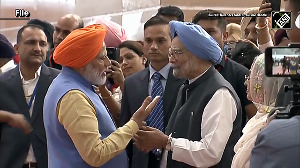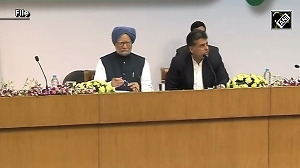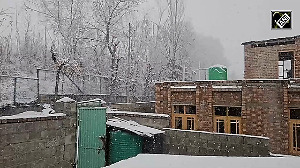Fashions change with seasons. In the aftermath of a newly-rekindled Indo-Pakistan bonhomie it is no longer fashionable to get all worked up over the peccadilloes of our neighbour. Thus, it took External Affairs Minister Yashwant Sinha nearly a week to come up with India's first reaction to one of the most sensational stories of recent times -- the drama surrounding the disclosures of the nuclear supermarket run by Abdul Qadeer Khan from Pakistan. In more normal times, South Block mandarins would have been inundating the media will delicious confirmations of Pakistan's status as a rogue state. Today, there is an appearance of relative disinterest.
Since foreign policy is all about enlightened self-interest, you could well argue that it does not suit India at this point to add its voice to the international outrage in the West over the brazen cover-up in Pakistan. If the US can be more than indulgent towards President Pervez Musharraf and the Pakistani military establishment for the help in fighting Al Qaeda and the Taliban in Afghanistan, we can afford to be similarly blinkered because of the assurances provided in Islamabad last month.
More to the point, if the US State Department and the UN nuclear watchdog agency are busy asking all the awkward questions and George Tenet is happy parading Khan's outing as a success of a CIA and MI6 operation, is there any need for India to add its two-paisa bit? The less India flaunts its obvious satisfaction at Musharraf's grave embarrassment, the more difficult it will for Pakistan to invoke the crass imagery that surrounds the Ghauri and Ghazni missiles.
To put it bluntly, it suits India at this stage to let Colin Powell and Jack Straw answer all the pointed questions about the West's double-standards. If Saddam Hussein can be punished for thinking about Weapons of Mass Destruction, how can Pakistan be let off the hook completely for supplying nuclear know-how to Libya, Iran and North Korea? Last summer, at the height of the Iraq crisis, the French writer Bernard-Henri Levy (author of Who Killed Daniel Pearl?) was mocked for suggesting that the US had invaded the wrong country. Now, I can well envisage a rush for membership of the club that believes that peace in South Asian depends on immobilising Pakistan's nuclear arsenal.
Actually, it is more than peace in either South Asia or even the Islamic world that is at stake. From all accounts, it was neither hatred of India nor Islamic pride that prompted Khan to tell all. It was a matter of old-fashioned cash deposited discreetly into offshore accounts. It is inconceivable that all this could have happened without a section of the Pakistan military establishment getting a piece of the action.
Do read: Pakistan's nuclear bazaar
Yet, the problem, as I re-discovered last Friday during the Madhavrao Scindia memorial lecture delivered by the British foreign secretary, is that there are too many Indians, who are still blessed by a Cold War mindset. It is very easy to score instant debating points by rubbishing Anglo-American unilateralism in Iraq. But is that the issue now? Or, shouldn't the focus now be on how India can best take advantage of the growing outrage over Pakistan?
Undeniably, the best course would be for the US and its NATO allies to sponsor an expeditionary force across the Khyber Pass, bomb Kahuta out of existence and ship the deviant metallurgist to Guantanamo Bay or exile him to his luxury hotel in Timbuktu. Another option would be to institute an internationally-sponsored Truth Commission where Khan and his military collaborators can tell all.
'We are walking into America's trap:' An interview with the former ISI chief
Unfortunately, the likelihood of these suggestions being accepted is remote. It does not make sense for either India or the vocal Diaspora lobby to press for visible punitive action against Pakistan. As long as Afghanistan remains troubled and as long as the West harbours ill-founded feelings of guilt over Islamist anger about Israel, there will be no heavy-handed treatment of Pakistan. That should not worry us unduly. It makes much more sense to work quietly with the US and Britain in the slow process of Pakistan's nuclear emasculation.
There are reasons to believe the process has started. Following the Khan disclosures, the US State Department has let it be known that a US Liaison Committee has been working discreetly in Pakistan for more than a year to 'safeguard' more than 40 weapons in Pakistan's nuclear arsenal. Pressured at home, Colin Powell may follow it up with other steps.
I doubt that we will know too many details of this venture but it would be safe to believe that Washington and London's non-reaction to Musharraf's whitewash of Pakistan's roguish conduct is centred on a belief that it won't happen again. This may also mean that it may be a while before we see another Pakistani leader using nuclear blackmail as an instrument of conflict resolution.
The sledgehammer treatment of Saddam was one way of dealing with a monster. In the case of Pakistan, we may be about to witness more subtle ways of handling another criminal enterprise. The Iraqi regime was killed off; the Pakistani problem is being handled with psychiatry.






 © 2024 Rediff.com -
© 2024 Rediff.com -